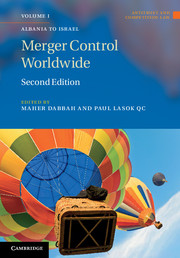Book contents
- Frontmatter
- Contents
- Preface
- List of Contributors
- Table of cases
- Table of Legislation and Official Guidance
- Introduction
- Albania
- Argentina
- Armenia (Republic of Armenia)
- Australia
- Austria
- Barbados
- Belgium
- Bosnia and Herzegovina
- Brazil
- Bulgaria (Republic of Bulgaria)
- Canada
- Chile
- China*
- Costa Rica
- Croatia
- Cyprus (Republic of Cyprus)
- Czech Republic
- Denmark
- Estonia
- European Economic Area
- European Union
- Finland
- France
- Germany (Federal Republic of Germany)
- Greece
- Hong Kong
- Hungary
- Iceland
- India
- Indonesia (Republic of Indonesia)
- Ireland
- Israel
- Italy
- Japan
- Kenya
- Korea
- Latvia
- Lithuania
- Macedonia (Republic of Macedonia)
- Malta
- Mexico
- Netherlands (The Netherlands)
- New Zealand
- Norway
- Pakistan
- Peru
- Philippines (Republic of the Philippines)
- Poland
- Portugal
- Romania
- Russia
- Serbia
- Singapore
- Slovakia (Slovak Republic)
- Slovenia
- South Africa
- Spain
- Sri Lanka
- Sweden
- Switzerland
- Taiwan
- Thailand
- Tunisia (Republic of Tunisia)
- Turkey
- Ukraine
- United Kingdom
- United States of America
- Uzbekistan
- Venezuela
- Zambia
- Index
Philippines (Republic of the Philippines)
Published online by Cambridge University Press: 05 November 2014
- Frontmatter
- Contents
- Preface
- List of Contributors
- Table of cases
- Table of Legislation and Official Guidance
- Introduction
- Albania
- Argentina
- Armenia (Republic of Armenia)
- Australia
- Austria
- Barbados
- Belgium
- Bosnia and Herzegovina
- Brazil
- Bulgaria (Republic of Bulgaria)
- Canada
- Chile
- China*
- Costa Rica
- Croatia
- Cyprus (Republic of Cyprus)
- Czech Republic
- Denmark
- Estonia
- European Economic Area
- European Union
- Finland
- France
- Germany (Federal Republic of Germany)
- Greece
- Hong Kong
- Hungary
- Iceland
- India
- Indonesia (Republic of Indonesia)
- Ireland
- Israel
- Italy
- Japan
- Kenya
- Korea
- Latvia
- Lithuania
- Macedonia (Republic of Macedonia)
- Malta
- Mexico
- Netherlands (The Netherlands)
- New Zealand
- Norway
- Pakistan
- Peru
- Philippines (Republic of the Philippines)
- Poland
- Portugal
- Romania
- Russia
- Serbia
- Singapore
- Slovakia (Slovak Republic)
- Slovenia
- South Africa
- Spain
- Sri Lanka
- Sweden
- Switzerland
- Taiwan
- Thailand
- Tunisia (Republic of Tunisia)
- Turkey
- Ukraine
- United Kingdom
- United States of America
- Uzbekistan
- Venezuela
- Zambia
- Index
Summary
Relevant legislation and statutory standards
The legislative provisions applicable to mergers are not contained in a single legal instrument but are to be found in the following: Article XII, Section 19, of the 1987 Constitution of the Republic of the Philippines (‘the Philippine Constitution’); Sections 76, 77, 78, 79, 80 and 132 of the Corporation Code of the Philippines (‘Corporation Code’); Article 186 of the Revised Penal Code of the Philippines (‘Revised Penal Code’); and Article 28 of the New Civil Code of the Philippines (‘Civil Code’).
Decision-making bodies and enforcement authority(ies)
Mergers must be notified to the Securities and Exchange Commission of the Philippines (SEC) for it to decide whether or not the merger in question is consistent with the Corporation Code and any other existing laws. The SEC is an administrative collegiate body with the following powers and functions:
to exercise jurisdiction and supervision over all corporations, partnerships or associations which are the grantees of primary franchises and/or a licence or permit issued by the Government;
to formulate policies and make recommendations on issues concerning the securities market, advise the Congress of the Philippines and other Government agencies on all aspects of the securities market, and propose legislation and amendments thereto;
to approve, reject, suspend, revoke or require amendments to registration statements, and registration and licensing applications;
to regulate, investigate or supervise the activities of persons to ensure their compliance with legislative and other requirements;
to supervise, monitor, suspend or take over the activities of exchanges, clearing agencies and other self-regulating organisations;
to impose sanctions for the violation of laws and the rules, regulations and orders issued pursuant thereto;
to prepare, approve, amend or repeal rules, regulations and orders; to issue opinions, provide guidance on and supervise compliance with such rules, regulations and orders;
to enlist the aid and support of and/or authorise to act any and all enforcement agencies of the Government, whether civil or military, as well as any private institution, corporation, firm, association or person in the implementation of its powers and functions under the Corporation Code;
to issue cease and desist orders to prevent fraud or injury to the investing public;
to punish for contempt of the SEC, both direct and indirect, in accordance with the relevant provisions of, and the penalties prescribed by, Rules of Court;
- Type
- Chapter
- Information
- Merger Control Worldwide , pp. 1069 - 1079Publisher: Cambridge University PressPrint publication year: 2012

